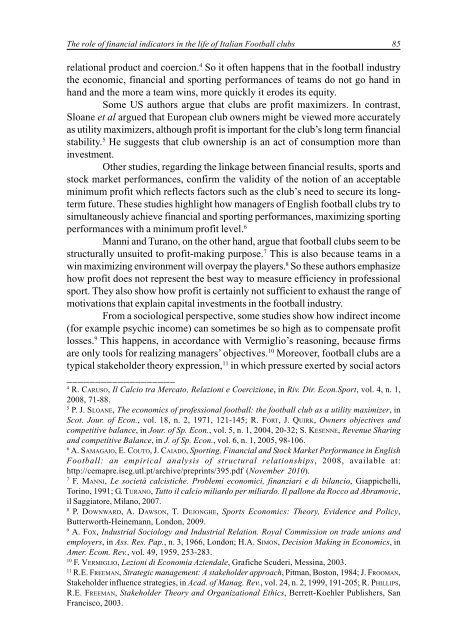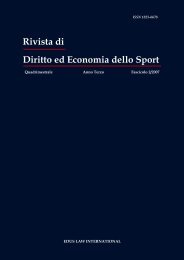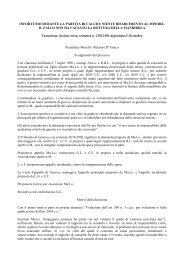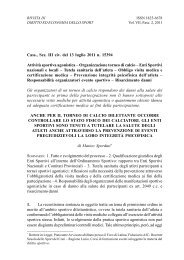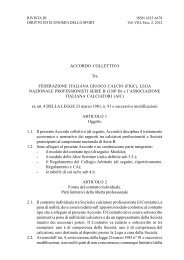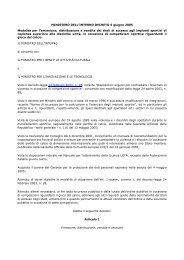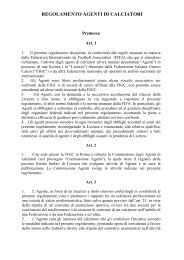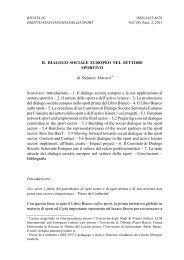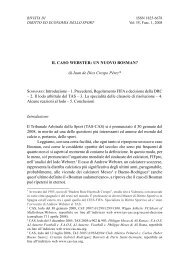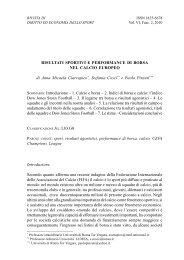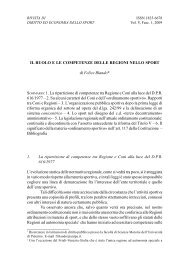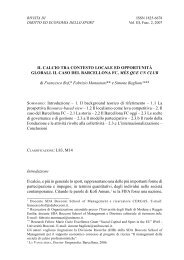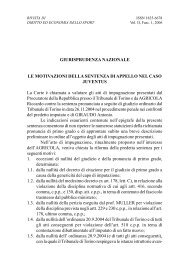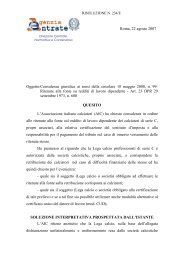Scarica il fascicolo completo - Rdes.It
Scarica il fascicolo completo - Rdes.It
Scarica il fascicolo completo - Rdes.It
Create successful ePaper yourself
Turn your PDF publications into a flip-book with our unique Google optimized e-Paper software.
The role of financial indicators in the life of <strong>It</strong>alian Football clubs 85<br />
relational product and coercion. 4 So it often happens that in the football industry<br />
the economic, financial and sporting performances of teams do not go hand in<br />
hand and the more a team wins, more quickly it erodes its equity.<br />
Some US authors argue that clubs are profit maximizers. In contrast,<br />
Sloane et al argued that European club owners might be viewed more accurately<br />
as ut<strong>il</strong>ity maximizers, although profit is important for the club’s long term financial<br />
stab<strong>il</strong>ity. 5 He suggests that club ownership is an act of consumption more than<br />
investment.<br />
Other studies, regarding the linkage between financial results, sports and<br />
stock market performances, confirm the validity of the notion of an acceptable<br />
minimum profit which reflects factors such as the club’s need to secure its longterm<br />
future. These studies highlight how managers of English football clubs try to<br />
simultaneously achieve financial and sporting performances, maximizing sporting<br />
performances with a minimum profit level. 6<br />
Manni and Turano, on the other hand, argue that football clubs seem to be<br />
structurally unsuited to profit-making purpose. 7 This is also because teams in a<br />
win maximizing environment w<strong>il</strong>l overpay the players. 8 So these authors emphasize<br />
how profit does not represent the best way to measure efficiency in professional<br />
sport. They also show how profit is certainly not sufficient to exhaust the range of<br />
motivations that explain capital investments in the football industry.<br />
From a sociological perspective, some studies show how indirect income<br />
(for example psychic income) can sometimes be so high as to compensate profit<br />
losses. 9 This happens, in accordance with Vermiglio’s reasoning, because firms<br />
are only tools for realizing managers’ objectives. 10 Moreover, football clubs are a<br />
typical stakeholder theory expression, 11 in which pressure exerted by social actors<br />
___________________<br />
4 R. CARUSO, Il Calcio tra Mercato, Relazioni e Coercizione, in Riv. Dir. Econ.Sport, vol. 4, n. 1,<br />
2008, 71-88.<br />
5 P. J. SLOANE, The economics of professional football: the football club as a ut<strong>il</strong>ity maximizer, in<br />
Scot. Jour. of Econ., vol. 18, n. 2, 1971, 121-145; R. FORT, J. QUIRK, Owners objectives and<br />
competitive balance, in Jour. of Sp. Econ., vol. 5, n. 1, 2004, 20-32; S. KESENNE, Revenue Sharing<br />
and competitive Balance, in J. of Sp. Econ., vol. 6, n. 1, 2005, 98-106.<br />
6 A. SAMAGAIO, E. COUTO, J. CAIADO, Sporting, Financial and Stock Market Performance in English<br />
Football: an empirical analysis of structural relationships, 2008, ava<strong>il</strong>able at:<br />
http://cemapre.iseg.utl.pt/archive/preprints/395.pdf (November 2010).<br />
7 F. MANNI, Le società calcistiche. Problemi economici, finanziari e di b<strong>il</strong>ancio, Giappichelli,<br />
Torino, 1991; G. TURANO, Tutto <strong>il</strong> calcio m<strong>il</strong>iardo per m<strong>il</strong>iardo. Il pallone da Rocco ad Abramovic,<br />
<strong>il</strong> Saggiatore, M<strong>il</strong>ano, 2007.<br />
8 P. DOWNWARD, A. DAWSON, T. DEJONGHE, Sports Economics: Theory, Evidence and Policy,<br />
Butterworth-Heinemann, London, 2009.<br />
9 A. FOX, Industrial Sociology and Industrial Relation. Royal Commission on trade unions and<br />
employers, in Ass. Res. Pap., n. 3, 1966, London; H.A. SIMON, Decision Making in Economics, in<br />
Amer. Ecom. Rev., vol. 49, 1959, 253-283.<br />
10 F. VERMIGLIO, Lezioni di Economia Aziendale, Grafiche Scuderi, Messina, 2003.<br />
11 R.E. FREEMAN, Strategic management: A stakeholder approach, Pitman, Boston, 1984; J. FROOMAN,<br />
Stakeholder influence strategies, in Acad. of Manag. Rev., vol. 24, n. 2, 1999, 191-205; R. PHILLIPS,<br />
R.E. FREEMAN, Stakeholder Theory and Organizational Ethics, Berrett-Koehler Publishers, San<br />
Francisco, 2003.


